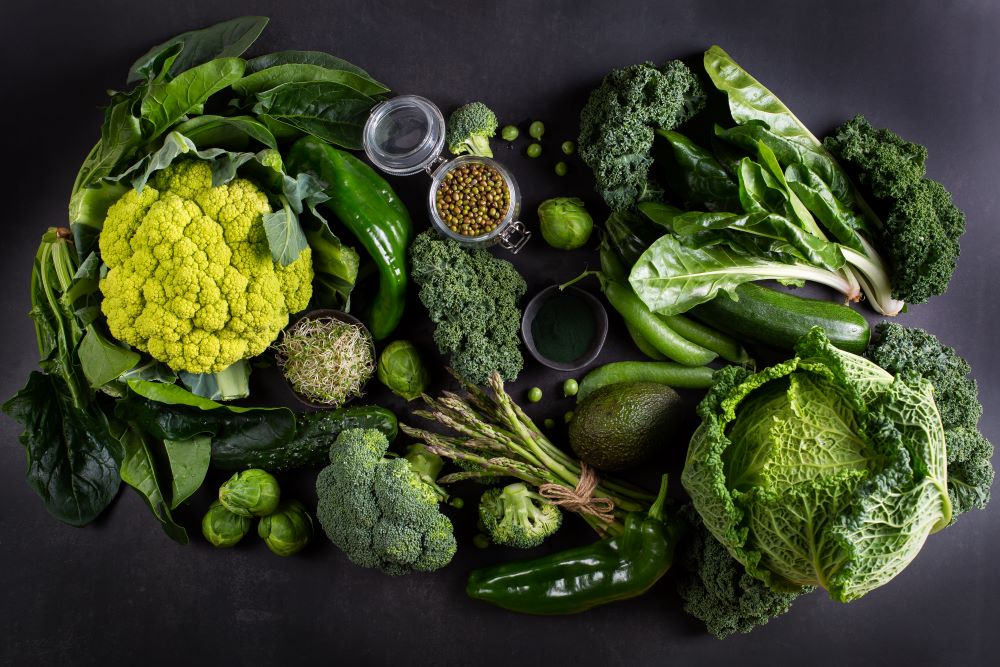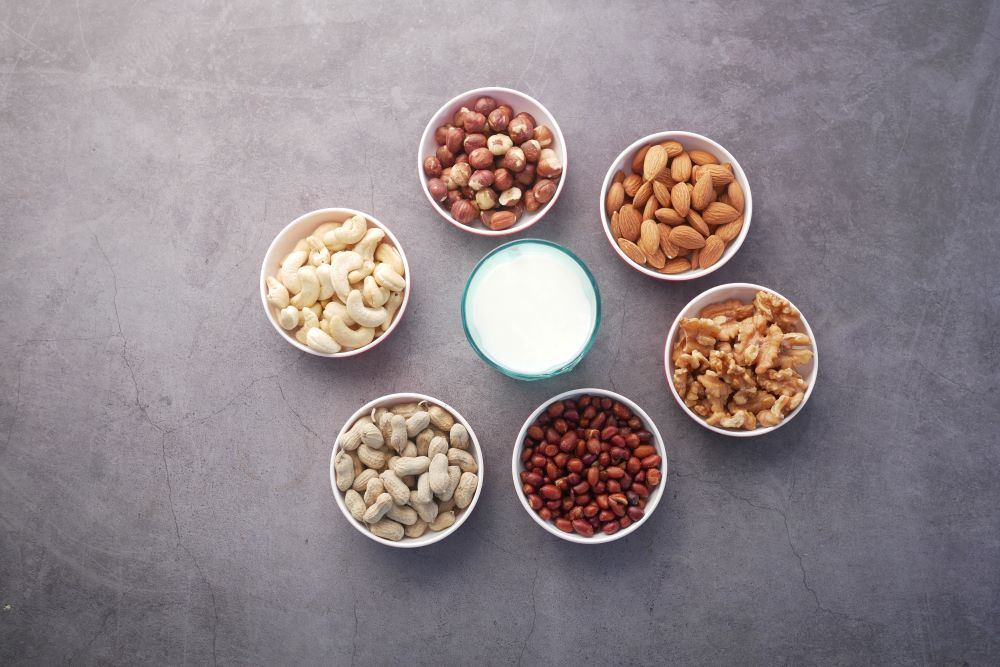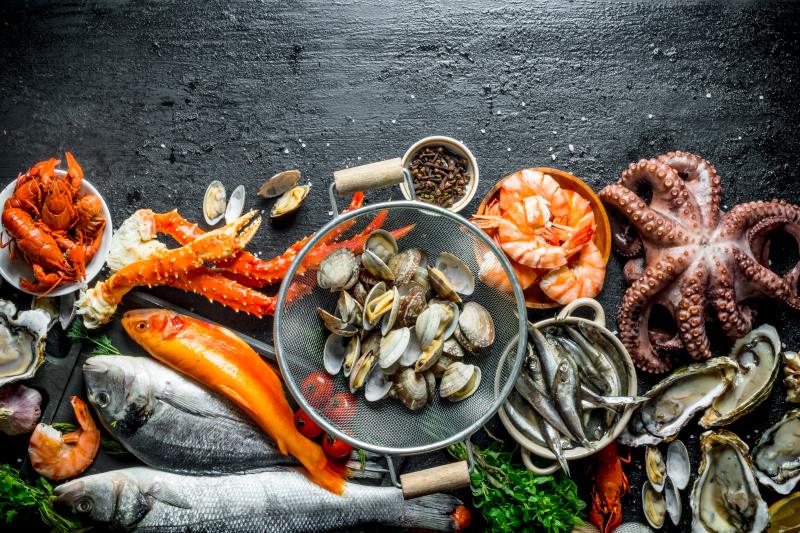45 Calcium Rich Foods, Fruits & Vegetables to Include in your Diet

Ensuring adequate calcium intake is paramount in the pursuit of good health. This essential mineral plays an important role in strengthening bones and teeth. Besides this, it also helps in keeping the muscles and nervous system healthy. Fortunately, many delicious and nutritious selections are high in calcium.
From dairy products like milk, yoghurt, and cheese to plant sources like leafy vegetables, fruits, and seeds, there are plenty of delicious ways to add calcium-rich products to your diet, whether you're eating traditional after a road diet or looking for a vegan or lactose-free alternative.
Dive into the guide to calcium-rich foods to learn about their nutritional benefits and tips for incorporating them into your daily diet.

Table of Contents

What is Calcium?
The well-being of the human body is dependent on calcium, which is an essential mineral. The most important role it plays is in strengthening bones and teeth. But it does more than that; calcium is required for additional bodily functions like conducting electrical messages through nerves, muscle contraction, and clotting blood production.
Calcium also helps maintain the regular heartbeat and proper functioning of other vital organs. Calcium sources are popularly considered dairy foods such as milk, cheese, and yoghurt; however, there are other ways to get this element from fortified products, leafy vegetables, nuts, and certain kinds of fish. Adequate calcium consumption determines good health throughout life.
Where Are the Sources of Calcium?
Many foods are rich in calcium, meaning there are enough options for daily consumption. Milk, cheese, and yoghurt are among the top choices, as they contain a lot of calcium. On the other hand, people can get calcium from fortified orange juice, tofu, and breakfast cereals. This is done to meet different types of diets.
Other sources of natural calcium include leafy greens such as kale, spinach, and collard greens and nuts like almonds and sesame seeds. Besides, canned fish with bones, such as salmon and sardines, have large amounts of this essential mineral. By including these meals in your diet plan, you can ensure bone strength, muscle function, and general well-being.
Top 45 Food Items High in Calcium
Calcium-rich foods play a crucial role in maintaining strong bones and overall health. Incorporating these calcium-rich foods into your daily diet ensures you get the essential minerals your body needs to thrive.
Here is a diverse range of food items known for their high calcium content, making it easier for you to make informed choices and take proactive steps toward better health.
List of Calcium Rich Vegetables

Vegetables are excellent sources of calcium, providing a variety of nutrients along with this essential mineral. Incorporating the given calcium-rich vegetables into your meals offers calcium and contributes to overall health and well-being.
| SNo. | Vegetables | Description |
| 1 | Collard Greens | It is one of the calcium-rich vegetables, containing about 141 mg of calcium per 100 gm. |
| 2 | Turnip Greens | About 100 gm of these contain 137 mg of calcium, i.e., 11% of Daily Value (DV). |
| 3 | Spinach | These are again rich sources of calcium-rich foods, with 136 mg per 100 gm. |
| 4 | Mustard Greens | These are peppery-tasting greens, with about 118 mg of calcium every 100 gm. |
| 5 | Kale | Another green leafy vegetable, kale, helps you by providing nearly 132 mg of calcium every 100 gm. |
| 6 | Bok Choy | Every 100 gm of Chinese Bok Choy cabbage contains 93 mg of the same. |
| 7 | Okra | With its edible green seed pods, okra is a popular type of calcium-rich food in India, with 77 mg every 100 gm. |
| 8 | Beet Greens | These come with about 114 mg of calcium per 100 gm. |
| 9 | Parsley | Known for containing calcium, parsley leaves contain 138 mg of it in 100 gm. |
| 10 | Broccoli Raab | About 100 gm of cooked broccoli contains more than 118 mg of calcium. |
| 11 | Sweet Potatoes | These contain about 30 mg of calcium every 100 gm. |
| 12 | Celeriac | This root vegetable provides you with about 43 mg of calcium when you consume about 100 gm of it. |
| 13 | Brussels Sprouts | Another common green vegetable is about 36 mg of calcium in 100 gm of consumption. |
| 14 | Green Beans | Finally, they can be essential food for calcium since they offer about 44 mg of calcium per 100 gm. |
| 15 | Soybean Sprouts | These can provide 59 mg of calcium in 100 gm of consumption. |
List of Calcium Rich Fruits

Fruits are generally not known for their calcium content, but some varieties offer notable amounts of this essential mineral. Explore the following fruits high in calcium, along with their nutritional highlights.
| SNo. | Fruits | Description |
| 16 | Oranges | Oranges are fruits rich in calcium, containing 43 mg in 100 gm. |
| 17 | Prickly Pears | About 100 gm of pears can help you gain 56 mg of calcium. |
| 18 | Fortifiewd Orange Juice | Fortified orange juice, on the other hand, provides 140 mg of calcium and 11% DV. |
| 19 | Tangerines | These are highly calcium-rich foods, with 37 mg of calcium every 100 gm. |
| 20 | Kiwi | Kiwi fruits come with more than 34 mg of calcium every 100 gm. |
| 21 | Mulberries | On the other hand, these have rich calcium sources, as 100 gm contains 39 mg of calcium. |
| 22 | Papaya | People often consider papaya when looking for calcium-rich fruits containing 20mg in 100 gm. |
| 23 | Blackberries | Other fruits high in calcium include blackberries. These offer about 29 mg per 100 gm. |
| 24 | Guavas | About 18mg of guavas come with 18mg of calcium. |
| 25 | Apricots | These can also be included in the list since they contain 13 mg of calcium per 100 gm. |
| 26 | Pineapples | Similar calcium content is found in pineapples, as 100 gm of these offer 13mg. |
| 27 | Passion Fruit | These can contribute to your diet by offering 12 mg of calcium per 100 gm. |
List of Dairy Products Containing Calcium

Dairy products are known for their calcium content, making them staple sources of this essential mineral in many diets. Discover the top dairy items high in calcium and their nutritional contributions.
| SNo. | Food | Description |
| 28 | Milk | Every 1 cup of cow milk comes with 300mg of calcium. |
| 29 | Yoghurt | This is considered one of the rich sources of calcium. About 245 gm of yoghurt provides 23% of the daily value (DV). |
| 30 | Cheese | Every 100 gm of cheddar cheese comes with 721 mg of calcium. |
| 31 | Tofu | It can be a rich source of calcium, as it ranges between 275 and 861 mg per half-cup, depending on the brand. |
| 32 | Soy Milk | Each one cup of soy milk contains 200-300 mg of calcium. |
List of Seeds and Nuts Rich in Calcium

Seeds and nuts are nutrient-dense foods that also supply noteworthy amounts of calcium. Have a look at the top seeds and nuts high in calcium and their nutritional profiles.
| SNo. | Seed/Nut | Description |
| 33 | Sesame Seeds | These tiny seeds pack a punch of calcium, with about 975 mg per 100 gm, making them one of the best sources. |
| 34 | Chia Seeds | Chia seeds are also rich in calcium, providing approximately 631mg per 100 gm and other nutrients. |
| 35 | Almonds | Almonds offer a substantial amount of calcium, with around 264 mg per 100 gm, making them a nutritious choice. |
| 36 | Pistachios | Pistachios offer about 105 mg of calcium per 100 gm, making them a delicious and nutritious snack. |
| 37 | Flaxseeds | Flaxseeds are rich in calcium, providing around 255 mg per 100 gm and omega-3 fatty acids. |
| 38 | Hazelnuts | Hazelnuts are another good source of calcium, providing approximately 114 mg per 100 gm. |
| 39 | Pumpkin Seeds | Pumpkin seeds offer about 55 mg of calcium per 100 gm and other essential nutrients. |
| 40 | Walnuts | Walnuts are a good source of calcium, providing around 98 mg per 100 gm, along with healthy fats and protein. |
| 41 | Cashews | Cashews contain approximately 37 mg of calcium per 100 gm and other essential nutrients. |
List of Animal Proteins and Seafood High in Calcium

Certain animal proteins also offer significant calcium, contributing to overall dietary intake. The following animal protein sources are high in calcium and have nutritional values.
| SNo. | Food | Description |
| 42 | Eggs | Eggs are loaded with calcium, up to 50 mg per 100 gm of boiled eggs. |
| 43 | Catfish | This essential calcium-rich food contains 425 mg in every 3-ounce fillet. |
| 44 | Tuna | Another fatty fish, tuna, is rich in calcium, potassium, magnesium, and omega-3 fatty acids. |
| 45 | Sardines | A cup of canned sardines in oil provides 569 mg of calcium, which is rich for most adults. |
How Much Calcium Should You Intake Daily?
Calcium plays an important role in maintaining overall health. However, determining the right amount of calcium intake can vary depending on certain factors such as age, gender, and overall health status.
The table below mentions the recommended calcium intake levels for different age groups as per the National Institutes of Health to help you meet your body's needs.
| Age Group | Recommended Calcium Intake (milligrams per day) |
| Infants (0-6 months) | 200 mg |
| Infants (7-12 months) | 260 mg |
| Children (1-3 years) | 700 mg |
| Children (4-8 years) | 1,000 mg |
| Children (9-13 years) | 1,300 mg |
| Teens (14-18 years) | 1,300 mg |
| Adults (19-50 years) | 1,000 mg |
| Pregnant/Lactating Teens | 1,300 mg |
| Pregnant/Lactating Adults | 1,000 mg |
| Adults (51-70 years) | 1,000 mg (men) 1,200 mg (women) |
| Adults (71 years and older) | 1,200 mg |
Health Benefits of Including Calcium Rich Foods in Diet
According to the Harvard School of Public Health, incorporating calcium-rich foods into your diet offers numerous health benefits beyond strengthening your bones. From supporting muscle function to aiding in nerve transmission, calcium plays a vital role in overall well-being.
Ensuring an adequate intake of calcium-rich foods can contribute to overall vitality and reduce the risk of various health issues. Below are the various health advantages of including calcium-rich foods in your daily meals:
Strengthens Bones and Teeth: Regular consumption of calcium-rich foods helps fortify bones and teeth and decreases the risk of osteoporosis and dental problems later in life.
Enhances Nerve Signalling: Calcium ions play a crucial role in nerve transmission, ensuring smooth communication between the brain and the rest of the body.
Facilitates Blood Clotting: Calcium is essential for blood clotting, helping to prevent excessive bleeding and promoting wound healing.
Supports Hormonal Balance: Calcium regulates hormone secretion, contributing to the proper functioning of various bodily processes, including metabolism and growth.
Regulates Blood Pressure: Adequate calcium intake can aid you in regulating blood pressure levels, promote cardiovascular health and reduce the risk of hypertension.
Helps in Preventing Cardiovascular Disease: Calcium-rich diets have been associated with a lower risk of several cardiovascular diseases, including stroke and heart disease.
Reduces Risk of Colorectal Cancer: Studies suggest that calcium-rich diets may lower the risk of colorectal cancer by promoting healthy cell growth in the colon.
Prevents Kidney Stones: Calcium-rich foods, when consumed as part of a balanced diet, aids in preventing the formation of kidney stones by binding to oxalate in the intestines.
Incorporating various calcium-rich foods into your diet, such as dairy products, leafy greens, nuts, and fortified foods, can help you reap these health benefits and support your overall well-being.
Different Ways to Include Calcium Rich Foods in Your Diet
With the right strategies, incorporating calcium-rich foods into your daily diet can be simple and delicious. Here are some tips on incorporating various calcium-rich foods into your diet. Doing so can ensure you meet your body's calcium needs and support optimal health and well-being.
Include Dairy Products: Dairy products such as milk, yoghurt, and cheese are excellent sources of calcium. Incorporate these foods into your meals by enjoying a bowl of yoghurt with fresh fruit for breakfast, adding cheese to salads or sandwiches, or sipping on a glass of milk as a snack.
Choose Leafy Greens: Leafy green vegetables such as kale and collard greens are rich in calcium and other essential nutrients. For a nutritious boost, add these greens to salads, stir-fries, soups, or smoothies. Try incorporating spinach into omelettes or using kale as a base for hearty salads.
Opt for Fortified Foods: Many foods are fortified with calcium to enhance their nutritional value. Look for fortified options such as fortified cereals, plant-based milk alternatives, and juices. These fortified foods can provide a convenient way to increase your calcium intake.
Snack on Nuts and Seeds; Seeds and nuts, such as almonds, sesame seeds, and chia seeds, are delicious and packed with calcium. Enjoy a handful of seeds and nuts as a snack, or sprinkle them over salads, yoghurt, or oatmeal for added crunch and nutrition.
Incorporate Calcium-Fortified Beverages: In addition to milk, consider incorporating other calcium-fortified beverages into your diet, such as fortified orange juice, almond milk, or soy milk. These beverages can be enjoyed independently or used as a base for smoothies or other recipes.
What are the Symptoms of Calcium Deficiency?
Calcium deficiency can cause various health issues. Recognising the symptoms of calcium deficiency is crucial for maintaining overall health and addressing any potential deficiencies. The given below are some common indicators of calcium deficiency that you should watch out for:
What are the Health Risks of Not Getting Enough Calcium?
A deficiency in calcium intake can lead to various health risks and complications. Below are some of the potential health risks associated with not getting enough calcium:
What are the Side Effects of Excessive Calcium Intake?
While calcium is essential for overall health, consuming excessive calcium can lead to adverse effects and health risks. Given below are some of the potential health risks associated with overconsumption of calcium:
Should You Take a Calcium Supplement?
Deciding whether to take a calcium supplement hinges on age, gender, dietary habits, and health status. While calcium is vital for bone health and muscle function, excess intake can pose risks. Hence, it's crucial to assess dietary calcium intake before considering supplements.
Individuals with calcium deficiencies or risks from dietary restrictions or medical conditions like osteoporosis may benefit from supplements. Yet, consulting a healthcare professional for dosage and compatibility with other medications is imperative. Prioritising a diet abundant in calcium-rich foods helps meet needs while minimising risks associated with supplementation.
In conclusion, incorporating calcium-rich foods into your diet is vital in various physiological processes and essential for optimal health and well-being. By including a diverse range of calcium-containing foods, you can ensure you meet your daily calcium requirements.
However, balancing your intake and avoiding excessive supplementation is essential, as this can lead to adverse health effects. Prioritising a balanced diet rich in calcium, combined with regular physical activity and consultation with a healthcare professional, can help you achieve optimal health and reduce the risk of calcium-related deficiencies or complications in the long term.













